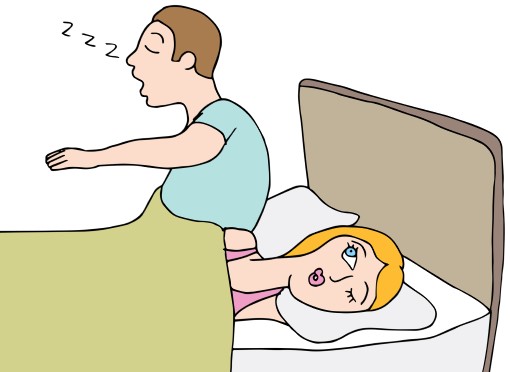
Is sleepwalking a sign of something more serious? – 6 reasons it might and what to do
By Jason Wooden, PhD | March 15, 2022
Sleepwalking has long been considered to be a result of genetics and other triggering factors. The things that sleepwalking may be a sign of include inadequate sleep, too much stress, excessive alcohol consumption, underlying health issues, and mental health challenges.
For better nights and peace of mind, your options included stress management, improving your sleep hygiene, relaxation exercises, sleepwalking prevention devices, getting a health checkup, and psychotherapy counseling.
Why it matters whether sleepwalking is a sign of something
It’s no surprise you’re wondering if sleepwalking is a sign of something else going on, especially when you don’t know why it’s happens.
It’s disturbing enough when someone sleepwalks from the bed to a downstairs couch, but what about if they pick up a dangerous object in the kitchen?
Or if they sleepwalk their way completely out of the house?
Would you believe there have even been stories of people driving a car while asleep!
That’s pretty unnerving to say the least.
Well, you’re likely not the only one suspicious that sleepwalking could be a sign of something lurking under the surface you need to know more about.
Research in the US has found that as many as 8 million adults sleepwalk. It’s also thought to affect up to 20% of kids.
Sleepwalking all by itself is alarming enough since it can put the safety of everyone at risk.
However, not knowing why it’s happening and worrying about what’s really going on can make life more stressful for everyone involved.
It’s bound to keep people up at night.
Your imagination may even run away thinking about what those things could be, especially if you’re heard things in the news or from people you know.
If it’s something serious for your health and wellbeing, you do need to address it.
Let’s take a look at what your sleepwalking could be saying to you and what you can do about it.
6 surprising and serious things sleepwalking could be sign of
Genetics is certainly a factor for sleepwalking since it tends to run in families. However, there are many other things sleepwalking could be a sign of something more serious:

1) You’re not getting enough sleep
Sleep-deprived people are believed to be more at risk for sleepwalking.
It’s important to keep in mind that how WELL you sleep is just as important as how LONG you sleep. That means you need to get enough cycles through all the stages of sleep.
Sleep experts say that adults need at least four to five cycles to feel rested which works out to about 6 to 9 hours.
You’re not the only one who’s in this boat as every night one in three people struggle with poor sleep. And it’s not just sleepwalking that’s at stake.
People who sleep poorly are at an increased risk for a myriad of challenges such as diabetes, high blood pressure, cardiovascular disease, obesity, anxiety, depression, and dementia.
Even things like chronic pain are worse when you’re not sleeping.

2) You’re over-stressed
Your mind, brain, and body can interact in powerful ways that affect health and wellness. Your body reacts to stress by releasing hormones which make your brain more alert, cause muscles to tense, and affect the body in other ways.
And stress has been found to be a trigger factor for up to 60% of sleepwalkers. As far as how it’s connected, they’re still figuring out what’s going on.
All the same, sleepwalking could be a sign you have too much stress in your life and you’re way too stressed out at bedtime.

3) You’re drinking too much
Your alcohol consumption is another thing to take a look at, especially if you’re a heavy drinker. Alcohol is known to sometimes trigger sleepwalking episodes.
It can also cause your sleep to be more shallow and is a risk factor for sleep disorders such as sleep apnea.

4) Something is going on with your health
Sleepwalking has been linked to asthma, conditions that affect the brain, fevers in children, heart rhythm problems, heartburn, psychiatric disorders, and sleep disorders such as sleep apnea

5) Something is going on with a medication you’re taking
Most medications have side effects and some may unfortunately trigger sleepwalking. Included on the list are antidepressants, antipsychotics, and beta-blockers
Even some insomnia meds such as sedatives (eszopiclone, zaleplon, and zolpidem) can cause you to sleepwalk.

6) A mental health challenge is affecting you more than you realize
People dealing with challenges such as depression, neurological disorders, obsessive-compulsive disorder, panic attacks, and posttraumatic stress disorder have been found to be more at risk for sleepwalking.
Sleepwalking remedies worth a try
If you’re really worried sleepwalking could be a sign of something more serious, there’s plenty of things you can do to prevent it and for your health.
1) Improve your sleep:
Since being over tired is a known trigger and poor sleep is linked to so many other things, I had to put this at the top of the list.
It’s important for a sleepwalker to get the best sleep they can every night. Start with sleep hygiene, the everyday things that set the stage for quality sleep.
For better sleep hygiene, you should:
- keep consistent wake up & sleep times
- avoid naps
- exercise during the day
- avoid large meals, alcohol, or stimulants such as caffeine before bedtime
- maintain a regular bedtime routine
- avoid using TVs, laptops, or other electronics before sleep
- keep your bedroom dark, cool, quiet, & relaxing
2) Stress management:
It’s important for you do whatever you can to be bring down the overall amount of stress in your life since it’s another known trigger for sleepwalking.
Your options include:
Mediation – simple mind-calming techniques to fight stress
Regular sleep – people who sleep poorly are more stressed once awake
Exercise – a natural mood booster and great way to fight the effects of stress on the body
Avoiding unnecessary stress – set boundaries around people and commitments
Set aside time for fun activities
Improving your mindset – how you think about things and react to them can have a big impact
Managing expectations – be realistic about what you can do
Living within your means – can help keep the financial stress down
3) Make sure you’re relaxed as possible at bedtime:
There’s plenty you can do to make sure your mind and body are relaxed as possible before going to sleep.
Relaxing music – calming music has been shown in studies to reduce stress and anxiety Learn more
Exercise – A natural mood booster and great way to fight the effects of stress on the body Learn more
Deep breathing – Deep breathing is a simple way to calm the body. One popular technique is 4-7-8 breathing pioneered by Dr Andrew Weil. Learn more
Light stretching – It can relax both the body and mind
Natural relaxation aids – Extracts made from plants such as chamomile, lavender essential oils, and valerian have been found to be helpful. There’s also newcomers such as turmeric and CDB oil. Learn more
4) Anticipatory awakening:
This involves waking up someone about 15 minutes before they usually sleepwalk. The person then stays awake for a few minutes before falling asleep again.
5) Avoid alcohol:
Since alcohol may be a trigger for some people, it should be consumed earlier in the day to avoid it’s effects at night. Another good reason to avoid alcohol at night is that it causes your sleep to be more shallow.
And don’t forget the link to sleep apnea…
6) Sleepwalking prevention devices:
Your choices include gates, safety door locks, bedroom door alarms, motion sensors, and floor mat alarms.
If you’re worried sleepwalking is a sign of something more serious, here’s what else you should do
As mentioned earlier, not knowing why you’re sleepwalking and worrying there could be something more serious going on can be pretty stressful.
And sometimes the unknown is worse than things actually are.
The good news is there’s plenty you can do to get to the bottom of things and know where things are at.

Get a checkup
I’ve already mentioned the wide variety of health issues and medications that have been linked to sleep walking. A doctor can check for these underlying risk factors and help you figure out what you can do about them.
It’s also a good idea to get a checkup since so many other medical issues can affect sleep and make your nights more challenging.

See a sleep specialist
Did you know that an underlying sleep disorder can make it harder to sleep and increase the risk for sleepwalking? A sleep medicine doctor can check for things linked to sleepwalking such as sleep apnea.

Counseling
It’s hard to relax and transition to sleep when your over-stressed, anxious, or depressed.
A mental health professional such as a psychotherapist can help figure out ways to lower stress and anxiety that could be a sleepwalking trigger for you.
They can also help other mental health challenges found to be a risk factor for sleepwalking such as depression, obsessive-compulsive disorder, panic attacks, and posttraumatic stress disorder
You may also be interested in:
Useful sleepwalking aids and prevention devices
Is sleepwalking a sign of mental illness?
Can sleeping pills help with sleepwalking?
Can stress cause you to sleepwalk?
5 sleepwalking prevention devices worth a try
Can CBD help with sleepwalking?
Can IBS cause you to sleepwalk?
Can prescription meds cause sleepwalking? – 8 remedies
Sources:
1. “Sleepwalking more prevalent among U.S. adults than previously suspected, researcher says”, 2012, Stanford Medicine
2. “Preventing Sleepwalking: Scientific Findings to Help Stop a Chronic Sleepwalker”, 2022, amerisleep.com
3. “Lack Of Sleep Can Provoke Sleepwalking, Study Shows”, 2008, ScienceDaily
4. “Alaska Sleep Education Center
Enhance Your Sleep Cycles”, 2016, alaskasleep.com
5. “1 in 3 adults don’t get enough sleep”, CDC website
6. Is Restless Legs Syndrome Involved in Ambulation Related to Sleepwalking? Sleep. 2016 Apr 1; 39(4): 955–956.
7. “Parasomnias: Sleepwalking”, Cedars-Sinai
8. “Sleepwalking”, 2021, SleepFoundation.org
9. Sleepwalking (Somnambulism)”, WebMD
10. Medication induced sleepwalking: A systematic review. Sleep Med Rev. 2018 Feb;37:105-113.
11. “FDA adds Boxed Warning for risk of serious injuries caused by sleepwalking with certain prescription insomnia medicines”, fda.gov
12. “Sleepwalking More Likely With Several Psychiatric Disorders”, 2012, Psychiatry Online
13. “Exercising to relax”, 2020, Harvard Health Publishing
Connect with us:
About Us
Better Sleep Simplified® was founded as a place for you to get clear and well-researched information.
Our goal is to make sure you know about your options so that you take action sooner rather than later.
Check us out on YouTube:
Watch and Learn
Helpful sleep tips, interesting sleep facts and statistics you want to know about
Affiliate Disclosure
This site is a participant in the Amazon Services LLC Associates Program and other affiliate advertising programs designed to provide a means for sites to earn advertising fees by advertising and linking to them.
Important: BetterSleepSimplified.com is for informational purposes only and is not intended or implied to be a substitute for professional medical advice, diagnosis, or treatment. Always consult a physician for sleep and health concerns. See additional information.
